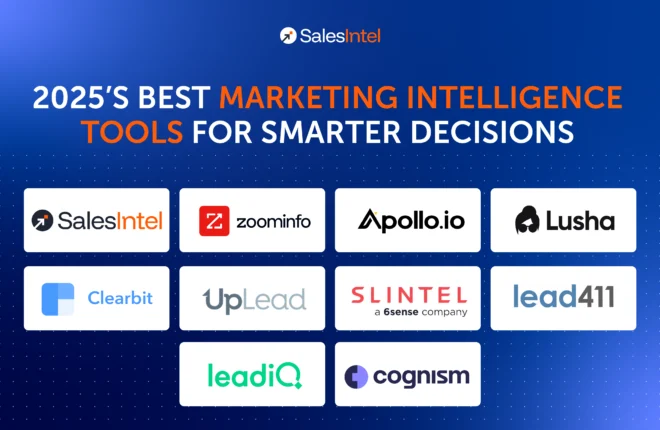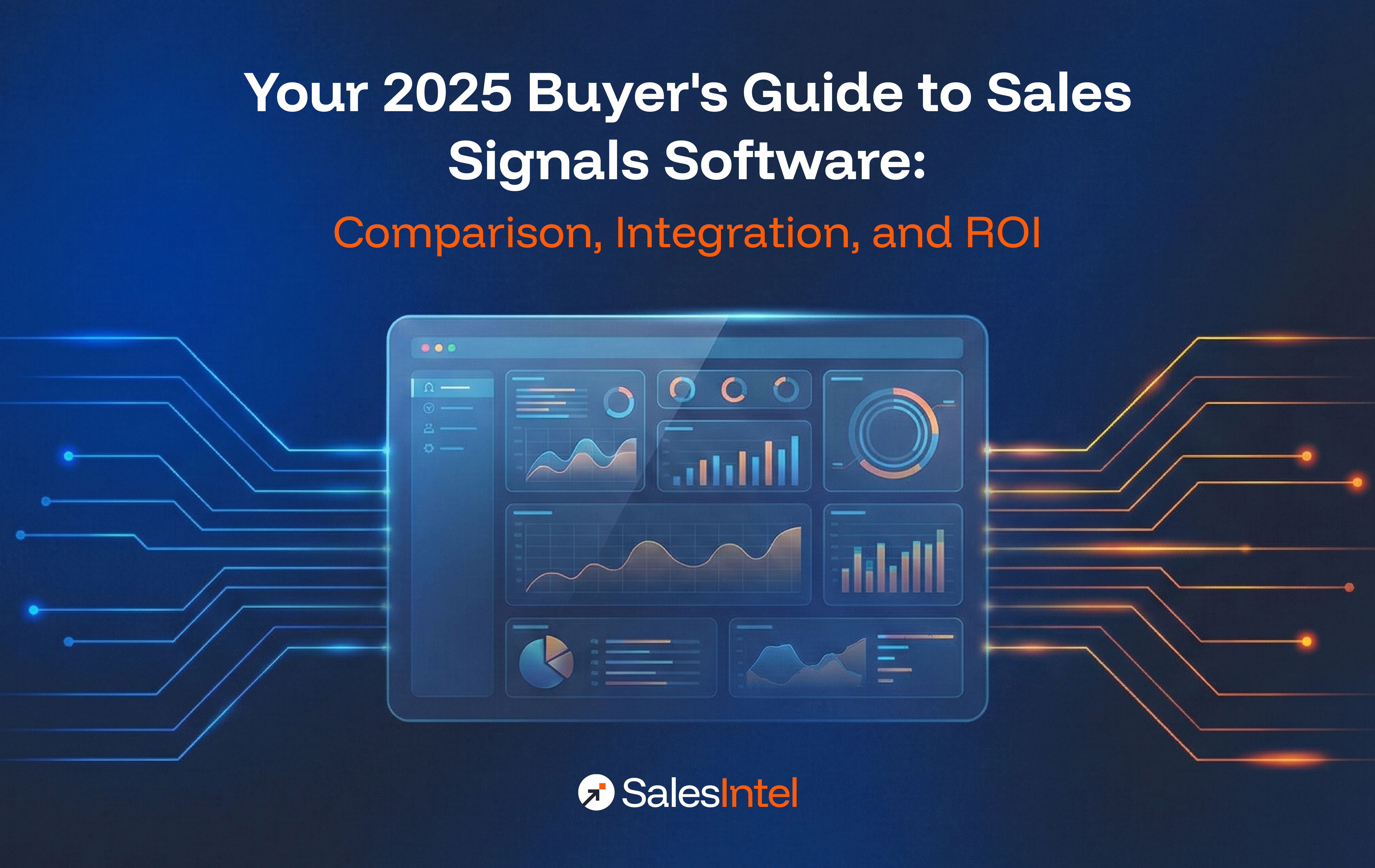“Let’s just send it to everyone” is no longer a strategy. We had some many podcasts and webinars recently, and everyone echoed that marketing used to be simpler. Throw a message out, hope it lands, and then wonder what went wrong.
Now, there’s no excuse for guesswork, especially when marketing intelligence tools are doing the heavy lifting.
From uncovering intent to knowing who clicked and why, these tools are shaping smarter, leaner, and better decisions in 2025.
Let’s look at the ten best marketing intelligence tools this year, starting with one that’s quietly changing the game.
| Tool | Overview | Key Features | G2 Rating | Best For |
|---|---|---|---|---|
| SalesIntel | A B2B marketing intelligence platform offering human-verified data, intent insights, and auto-enrichment tools for accurate, actionable outreach. |
|
4.3/5 | Teams needing the most accurate and enriched data with automation and intent capabilities |
| ZoomInfo | A powerhouse database with deep contact coverage and advanced filters, but it comes with a high cost and complex usage. |
|
4.4/5 | Enterprises needing large-scale data and advanced segmentation |
| Clearbit | Known for real-time enrichment and anonymous visitor identification, helping marketers personalize faster. |
|
4.3/5 | Marketers focused on website intelligence and personalization |
| Lusha | Lightweight and fast tool ideal for SDRs; excels in quick contact lookup through its Chrome extension |
|
4.3/5 | SMBs and SDRs needing quick and affordable prospect data |
| Apollo.io | A full-stack engagement and prospecting platform, data + outreach + analytics in one. |
|
4.7/5 | Teams wanting data and engagement workflows in one platform |
| UpLead | A budget-friendly ZoomInfo alternative focused on real-time verified leads with clean usability. |
|
4.7/5 | Businesses needing verified leads without high subscription costs |
| LeadIQ | A LinkedIn-first prospecting tool that simplifies lead capture and tracking without overcomplicating workflows. |
|
4.2/5 | Sales teams doing LinkedIn-heavy prospecting |
| Cognism | A compliance-first data provider with mobile accuracy and strong intent layering, popular in Europe. |
|
4.6/5 | Teams prioritizing mobile accuracy and compliance |
| Slintel (by 6sense) | Uses predictive intelligence to identify ready-to-buy accounts, ideal for ABM-focused organizations. |
|
4.4/5 | ABM teams need predictive insights on buyer behavior |
| Lead411 | A cost-effective and intent-driven data solution offering actionable alerts and verified contacts. |
|
4.6/5 | Price-conscious teams needing verified data + intent alerts |
1. SalesIntel
SalesIntel is a B2B marketing intelligence platform that provides human-verified contact data, firmographics, and technographics to help businesses identify and connect with the right prospects.
We track over 30 buying signals across the entire customer journey – from early indicators like funding rounds and leadership changes to late-stage actions such as website visits. This end-to-end visibility helps identify in-market ICP accounts and map buying groups, giving you the first-mover advantage before formal evaluations begin.
It also offers advanced intent data solutions and real-time prospecting tools for LinkedIn.
Key features:
- Human-verified contact data: Ensures accuracy with a 95% verification rate
- Firmographics & technographics: Gain deep insights into target accounts based on company details and technology stack
- Verified Mobile Dials: Access direct-dial numbers for decision-makers
- Buyer Intent & Intent Automation: Identify prospects actively researching your solution
- Manual & Auto-Enrichment: Keep CRM and marketing automation platforms updated with accurate data
- FormsIntel: Reduce form fields while enriching lead data in real time
- VisitorIntel: Unmask anonymous website visitors and track engagement
- ICPIntel: Build hyper-targeted prospect lists based on your ideal customer profile
- AdsIntel: Run highly targeted ad campaigns using enriched B2B data
- RevDriver Chrome Extension: Prospect in real-time on LinkedIn with instant access to verified contact data
- Data Privacy: GDPR and CCPA compliant for data privacy
- Integrations: Integrations with widely used CRM and marketing automation tools
G2 Rating: 4.3/5
2. ZoomInfo
ZoomInfo is like that big box store you walk into for one thing and walk out with twenty.
It’s been in the game long enough to build a massive reputation, and in many ways, a massive dataset to match.
But here’s the thing. The depth is real. So are the costs.
If you don’t regularly check what you’re using and how, you might find your budget doing some unexpected heavy lifting.
Features:
- A huge contact and company database that’s hard to beat
- Smart segmentation with advanced filtering options
- Sales automation features available, but they come at a price
- Plays well with major CRMs like Salesforce, HubSpot, and more
G2 Rating: 4.4/5
3. Clearbit
Clearbit doesn’t make a lot of noise, but it shows up exactly when you need it.
Imagine someone casually sliding into the room, pointing at your website traffic, and saying, “That’s your next lead.”
That’s Clearbit’s vibe. Quiet confidence.
It shines when used for real-time enrichment and turning nameless clicks into actual profiles.
Features:
- Real-time lead enrichment as users engage
- Clearbit Reveal helps identify anonymous visitors
- Ideal for marketers who like to personalize without manual guesswork
- Integrates seamlessly with tools like Segment, HubSpot, and Slack
G2 Rating: 4.3/5
4. Lusha
Lusha is the digital equivalent of a sticky note that just knows things.
It’s quick, browser-based, and helps SDRs grab contact info before the next tab even loads.
Lightweight but useful. It won’t try to be everything and that’s the charm.
Features:
- Chrome extension that reveals direct dials and emails on the fly
- Some intent capabilities, but nothing too complex
- Minimal setup and a clean, distraction-free UI
- Pricing works well for startups and small sales teams
G2 Rating: 4.3/5
5. Apollo.io
Apollo.io walks into the room like it built the room.
It offers data, engagement workflows, prospecting tools, and analytics. Basically the works.
But here’s where it gets interesting.
Some users love the everything-in-one-place setup. Others feel they’re paying for a steak and only eating the fries.
Features:
- Large contact database that rivals most of the major players
- Sequence builder for email and LinkedIn outreach
- Integrated dialer and call logging
- Lead scoring plus engagement tracking for nurturing
G2 Rating: 4.7/5
6. UpLead
UpLead feels like that reliable restaurant you discover after being shocked by a fancy one’s prices.
It’s positioned as a ZoomInfo alternative, but with far fewer budgeting headaches.
What you get is a clean and straightforward interface that focuses on what you actually need: verified leads you can confidently reach out to.
No fluff. Just the data you’re paying for, and the peace of mind that comes with real-time email verification.
Features:
Real-time email verification so your emails don’t vanish into the spam void
Technographic filters to identify prospects based on their tech stack
Account-based targeting features that help you stay focused on high-fit leads
Smooth integrations with major CRMs like Salesforce and HubSpot, so your data flows without fuss
G2 Rating: 4.7/5
7. LeadIQ
LeadIQ is like the introvert at the party who turns out to be the smartest person in the room.
It doesn’t scream for attention but gets the job done with quiet confidence.
If your sales team relies heavily on LinkedIn prospecting and light-touch automation, LeadIQ might be your go-to.
It’s not trying to be everything, it’s trying to make prospecting suck less.
Features:
- Chrome extension that lets you grab leads straight from LinkedIn with fewer clicks
- Email sequencing tools that help you stay consistent without sounding robotic
- Built-in lead tracking and scoring to keep your lists from turning into digital dust
- Interface is clean and user-friendly, which SDRs actually appreciate on busy days
G2 Rating: 4.2/5
8. Cognism
Cognism is what you’d get if GDPR compliance and mobile accuracy had a data-savvy baby.
It’s particularly popular across Europe, and if your team lives on the phone, you might just want to take notes.
This isn’t just about names and emails. It’s about verified phone numbers that actually connect you to decision-makers, not gatekeepers.
Plus, their intent-driven targeting gives your outreach a head start before your competition even blinks.
Features:
- Mobile numbers for decision-makers so you skip the generic lines
- Intent data layering that helps you reach buyers while they’re still in the research phase
- GDPR and CCPA compliance that keeps your legal team relaxed
- Email verification to reduce bounces and increase reply chances
G2 Rating: 4.6/5
9. Slintel (by 6sense)
Slintel feels like the new team member who quietly observes, then surprises everyone by predicting which accounts will close next.
Now a part of 6sense, it goes beyond basic firmographics into technographics and buyer intent.
It’s particularly useful if your ABM strategy leans on predictive intelligence.
You’re not just identifying potential buyers. You’re tracking behavior to know who’s most likely to say yes.
Features:
- Deep technographic insights that uncover what tools your prospects are already using
- Buyer intent powered by 6sense’s predictive engine, so timing becomes a strength
- Competitor analysis to know where you stand before the first call
- Seamless integration with ABM platforms for synchronized execution
G2 Rating: 4.4/5
10. Lead411
Lead411 doesn’t always show up on top 10 lists, but maybe that’s because they’re too busy delivering solid results.
If you’re price-conscious and want verified data that includes intent, this tool might quietly become your sales team’s favorite.
It’s built for action, not analysis paralysis. So instead of downloading spreadsheets and wondering who to call, you’ll get alerts on actual buying signals.
Features:
- Intent data bundled with contact details to make your emails more relevant
- Alerts on company triggers like funding rounds, leadership changes, and hiring spikes
- Verified B2B emails and phone numbers that reduce wasted outreach
- CRM integration so you can sync everything without extra hands-on time
G2 Rating: 4.6/5
Why SalesIntel Works for Best for GTM Teams
What sets SalesIntel apart is its ability to adapt to the needs of small startups, fast-growing mid-market teams, and enterprise-level operations, without making you pay for what you won’t use.
- For smaller teams, the platform offers simplicity and clean UI, so your reps don’t need a two-week bootcamp just to get started. Tools like RevDriver and ICPIntel help find the right contacts fast so you’re not just guessing.
- Mid-sized companies love the balance between depth and usability. Features like real-time human-verified data, robust filters, and intent signals help build campaigns that actually convert.
- Enterprises benefit from advanced integrations, tailored onboarding, custom data research, and scalable intelligence that aligns with broader revenue teams.
And let’s not forget that SalesIntel’s support team is more like a partner than a helpdesk. Need a custom list? Done. Confused about a filter? They’ll walk you through it. Want onboarding for your whole sales team? Already scheduled.
One platform. Multiple layers of intelligence. Built for teams that don’t want to settle for surface-level data.
Final Thoughts:
You don’t need more data. You need the right kind of it, delivered in a way that actually helps.
Whether you’re refining your ICP, launching campaigns, or just trying to stop the “spray and pray” madness, the tools above are worth exploring.
And if you’re unsure where to start, 10 minutes with SalesIntel might just help you narrow the list faster than your next all-hands meeting.
FAQs
How to effectively leverage marketing intelligence for tasks like tracking campaigns, retargeting, traffic optimization, SEO analysis, and customer behavior pattern analysis?
Effective use of marketing intelligence starts with verified, compliant data consolidated from CRM, ad platforms, and web analytics. This unified view enables accurate campaign tracking, targeted retargeting, and informed traffic optimization. Integrating intent and behavioral insights further refines SEO strategies and helps uncover customer patterns for more precise engagement.
What are typical pricing models for marketing intelligence tools (e.g., free tier, subscription costs)?
Most marketing intelligence platforms follow a tiered subscription model based on data volume, user seats, and feature access. Entry-level or freemium options cater to smaller teams, while enterprise plans offer deeper analytics, integrations, and support. Pricing often reflects the depth of verified data and compliance capabilities included.
What marketing/sales intelligence tools are recommended for B2B lead generation and acquisition?
The best tools for B2B lead generation combine verified company and contact data with firmographic, technographic, and intent insights. Platforms that integrate seamlessly with CRMs and marketing automation tools allow sales and marketing teams to target in-market accounts efficiently and personalize outreach based on buying signals.
How does a marketing intelligence tool differentiate itself from existing solutions?
A strong differentiator lies in the tool’s ability to verify data accuracy, ensure proactive compliance, and integrate across a wide range of systems. Unlike basic data collectors, advanced solutions combine verification, privacy safeguards, and unified analytics to deliver more actionable, reliable intelligence for decision-making.
How to choose Marketing Intelligence Tools or what key features to look for?
Look for tools that emphasize data verification, privacy compliance, and deep integrations with your existing tech stack. Prioritize capabilities like AI-driven analytics, intent insights, customizable dashboards, and scalable architecture. A user-friendly interface and reliable support further ensure smooth adoption and measurable outcomes.
How to develop an effective Marketing Intelligence Strategy?
Start with clear goals like improving campaign ROI or understanding customer churn and identify key data sources. Build a process for ongoing data verification, compliance, and integration with existing systems. Use analytics to interpret verified insights, then act on findings to continuously refine marketing performance and audience engagement.
What is the difference between marketing intelligence and market intelligence?
Marketing intelligence focuses on internal performance – campaign data, customer behavior, and engagement metrics to optimize ongoing marketing efforts. Market intelligence looks outward, analyzing competitors, industry trends, and market dynamics. Both depend on verified, compliant data and integration for a complete view of opportunities and risks.
What is the distinction between Marketing Intelligence and Business Intelligence?
Business intelligence provides a broad, organization-wide view covering finance, operations, and sales. Marketing intelligence is more specialized, zeroing in on campaign performance, buyer intent, and customer engagement. Both rely on verified data, compliance alignment, and system integrations to translate information into strategic action.
What are leading alternatives to G2 Market Intelligence in 2025?
Strong alternatives are platforms that offer verified competitive insights, buyer intent data, and real-time market analysis. Look for tools with transparent data sources, built-in compliance, and integrations that connect insights directly to CRM and marketing systems. These ensure accuracy while supporting agile, data-driven decision-making.




